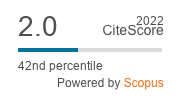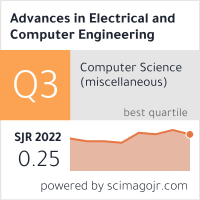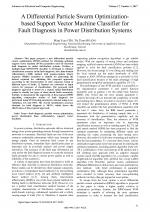| 3/2017 - 7 |
A Differential Particle Swarm Optimization-based Support Vector Machine Classifier for Fault Diagnosis in Power Distribution SystemsCHO, M. Y. |
| View the paper record and citations in |
| Click to see author's profile in |
| Download PDF |
Author keywords
fault diagnosis, particle swarm optimization, power distribution lines, reflectometry, support vector machines
References keywords
power(16), fault(15), systems(13), location(9), distribution(9), system(7), networks(7), artificial(6), swarm(5), neural(5)
Blue keywords are present in both the references section and the paper title.
About this article
Date of Publication: 2017-08-31
Volume 17, Issue 3, Year 2017, On page(s): 51 - 60
ISSN: 1582-7445, e-ISSN: 1844-7600
Digital Object Identifier: 10.4316/AECE.2017.03007
Web of Science Accession Number: 000410369500007
SCOPUS ID: 85028567448
Abstract
This paper proposes a new differential particle swarm optimization (DPSO) method for obtaining optimum support vector machine (SVM) parameters used for electrical fault diagnosis in radial distribution systems. Further, a multiple-stage DPSO-SVM classifier is developed to enhance classification accuracy in the fault diagnosis. Also, time-domain reflectometry (TDR) method with pseudo-random binary sequence (PRBS) excitation is utilized for generating the dataset required for validating this proposed approach. According to the characteristic of echo responses found in different types of faults, 12 features are extracted as input vectors for purposes of classification. The proposed fault diagnosis approach is tested on a typical radial distribution system to classify ten types of short-circuit faults accurately. Further, to demonstrate the superiority of the proposed DPSO algorithm, comparative studies of fault diagnosis are performed using SVM having parameters selected using cross-validation, GA and PSO. The overall classification accuracy obtained for fault diagnosis is 98.5%, which shows the effectiveness of the proposed approach. |
| References | | | Cited By |
Web of Science® Times Cited: 4 [View]
View record in Web of Science® [View]
View Related Records® [View]
Updated 3 days, 16 hours ago
SCOPUS® Times Cited: 7
View record in SCOPUS® [Free preview]
View citations in SCOPUS® [Free preview]
[1] Energy-efficient clustering method for wireless sensor networks using modified gravitational search algorithm, Ebrahimi Mood, Sepehr, Javidi, Mohammad Masoud, Evolving Systems, ISSN 1868-6478, Issue 4, Volume 11, 2020.
Digital Object Identifier: 10.1007/s12530-019-09264-x [CrossRef]
[2] Weak ultrasonic signal detection in strong noise, Wang Da-Wei<sup>1\2</sup>, , Wang Zhao-Ba,, Acta Physica Sinica, ISSN 1000-3290, Issue 21, Volume 67, 2018.
Digital Object Identifier: 10.7498/aps.67.20180789 [CrossRef]
[3] Hyper-parameter Tuning for Quantum Support Vector Machine, DEMIRTAS, F., TANYILDIZI, E., Advances in Electrical and Computer Engineering, ISSN 1582-7445, Issue 4, Volume 22, 2022.
Digital Object Identifier: 10.4316/AECE.2022.04006 [CrossRef] [Full text]
[4] Heuristic swarm intelligent optimization algorithm for path planning of agricultural product logistics distribution, Chen, Limin, Ma, Mengli, Sun, Lixin, Balas, Valentina E., Hong, Jer Lang, Gu, Jason, Lin, Tsung-Chih, Journal of Intelligent & Fuzzy Systems, ISSN 1064-1246, Issue 4, Volume 37, 2019.
Digital Object Identifier: 10.3233/JIFS-179304 [CrossRef]
[5] An Adaptive Fault Diagnosis Model for Railway Single and Double Action Turnout, Ji, Wenjiang, Zuo, Yuan, Fei, Rong, Xie, Guo, Zhang, Jiulong, Hei, Xinhong, IEEE Transactions on Intelligent Transportation Systems, ISSN 1524-9050, Issue 1, Volume 24, 2023.
Digital Object Identifier: 10.1109/TITS.2022.3221484 [CrossRef]
[6] Improved Particle Swarm Optimization-based Support Vector Machine for Fault Diagnostic of Arrester, Hoang, Thi Thom, Vu Le, Nguyen Anh, 2022 6th International Conference on Green Technology and Sustainable Development (GTSD), ISBN 978-1-6654-6628-8, 2022.
Digital Object Identifier: 10.1109/GTSD54989.2022.9989251 [CrossRef]
Disclaimer: All information displayed above was retrieved by using remote connections to respective databases. For the best user experience, we update all data by using background processes, and use caches in order to reduce the load on the servers we retrieve the information from. As we have no control on the availability of the database servers and sometimes the Internet connectivity may be affected, we do not guarantee the information is correct or complete. For the most accurate data, please always consult the database sites directly. Some external links require authentication or an institutional subscription.
Web of Science® is a registered trademark of Clarivate Analytics, Scopus® is a registered trademark of Elsevier B.V., other product names, company names, brand names, trademarks and logos are the property of their respective owners.
Faculty of Electrical Engineering and Computer Science
Stefan cel Mare University of Suceava, Romania
All rights reserved: Advances in Electrical and Computer Engineering is a registered trademark of the Stefan cel Mare University of Suceava. No part of this publication may be reproduced, stored in a retrieval system, photocopied, recorded or archived, without the written permission from the Editor. When authors submit their papers for publication, they agree that the copyright for their article be transferred to the Faculty of Electrical Engineering and Computer Science, Stefan cel Mare University of Suceava, Romania, if and only if the articles are accepted for publication. The copyright covers the exclusive rights to reproduce and distribute the article, including reprints and translations.
Permission for other use: The copyright owner's consent does not extend to copying for general distribution, for promotion, for creating new works, or for resale. Specific written permission must be obtained from the Editor for such copying. Direct linking to files hosted on this website is strictly prohibited.
Disclaimer: Whilst every effort is made by the publishers and editorial board to see that no inaccurate or misleading data, opinions or statements appear in this journal, they wish to make it clear that all information and opinions formulated in the articles, as well as linguistic accuracy, are the sole responsibility of the author.





